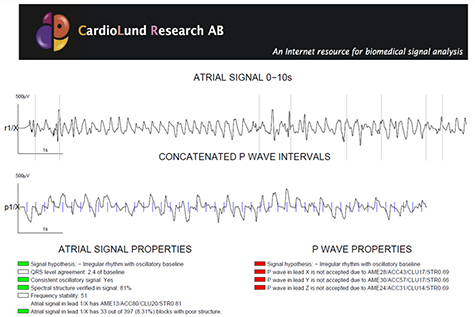Atrial fibrillatory rate as predictor of recurrence of atrial fibrillation in horses treated medically or with electrical cardioversion
Principal investigators: Helena Carstensen, Eva M. Hesselkilde, Charlotte Hopster-Iversen and Rikke Buhl
Atrial fibrillation is the most common sustained cardiac arrhythmia in horses with an estimated prevalence of 0.1-2.5% depending on breed and the sample studied. Treatment options include medical treatment and electrical cardioversion. An immediate high cardioversion rate this is followed by high AF recurrence rates (15-43%). Atrial fibrillation is a complex disease that remodels the atria, which further promotes AF and the high recurrence rates are believed to be linked to this remodelling. An acknowledged hallmark of atrial remodelling is the atrial fibrillatory rate (AFR) that measures the number of fibrillations (f waves) per minute (fpm). The AFR can be measured non-invasively from surface ECG recordings and has received considerable attention in horses over the recent years. The objective of the study is to evaluate if AFR derived from surface ECG could predict the outcome of AF treatment in horses. The aim of this study is therefore 1) to evaluate if AFR is associated to successful cardioversion and 2) to evaluate if AFR is correlated to AF recurrence after successful treatment.
The project is a multicentre study including seven referral centres (Ghent University, University of Pennsylvania, Rossdales Equine Hospital, University of Copenhagen, University of Zurich, Swedish University of Agricultural Sciences and Dubai Equine Hospital) contributing with clinical records and ECG recordings of horses presented with AF. Data are analysed at Lunds University in Sweden by the team of Professor Pyotr Platonov.

